Equinox OSGi应用嵌入Jersey框架搭建REST服务
原文地址:https://www.cnblogs.com/kira2will/p/5040264.html
一、环境
eclipse版本:eclipse-luna 4.4
jre版本:1.8
二、Equinox OSGi应用嵌入Jersey框架搭建REST服务
1.新建插件工程HelloWebOSGI
a.
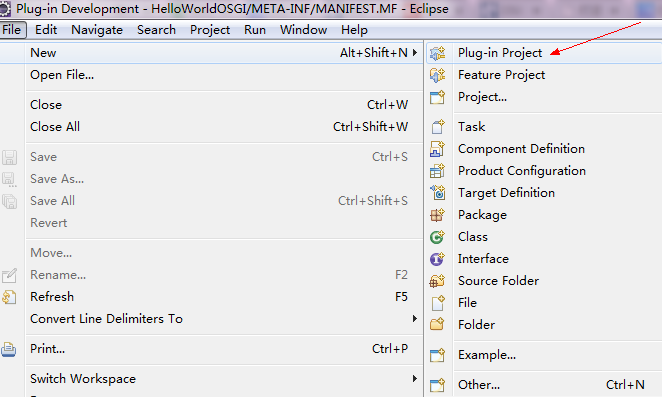
b.
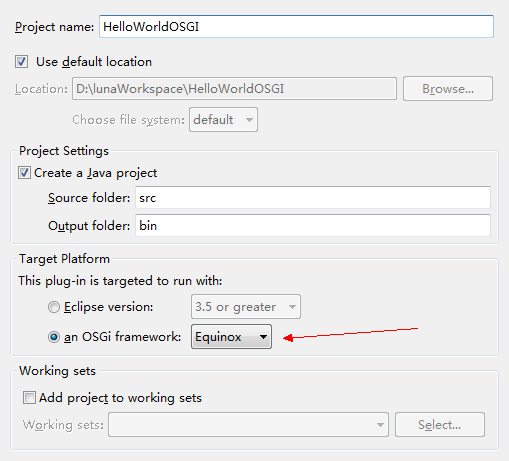
c.
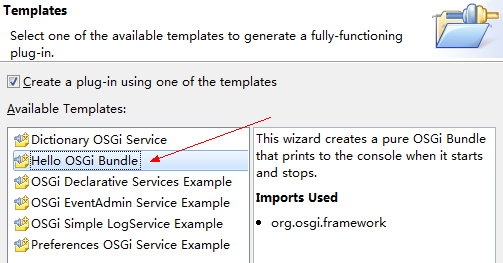
d.在新建的工程中新建文件夹lib,其中放入附件中的jar包(见文末),全部添加到工程Build Path中。


2.配置运行环境
a.配置引入包、依赖插件

b.选择Run->Run Configuration,new一个环境
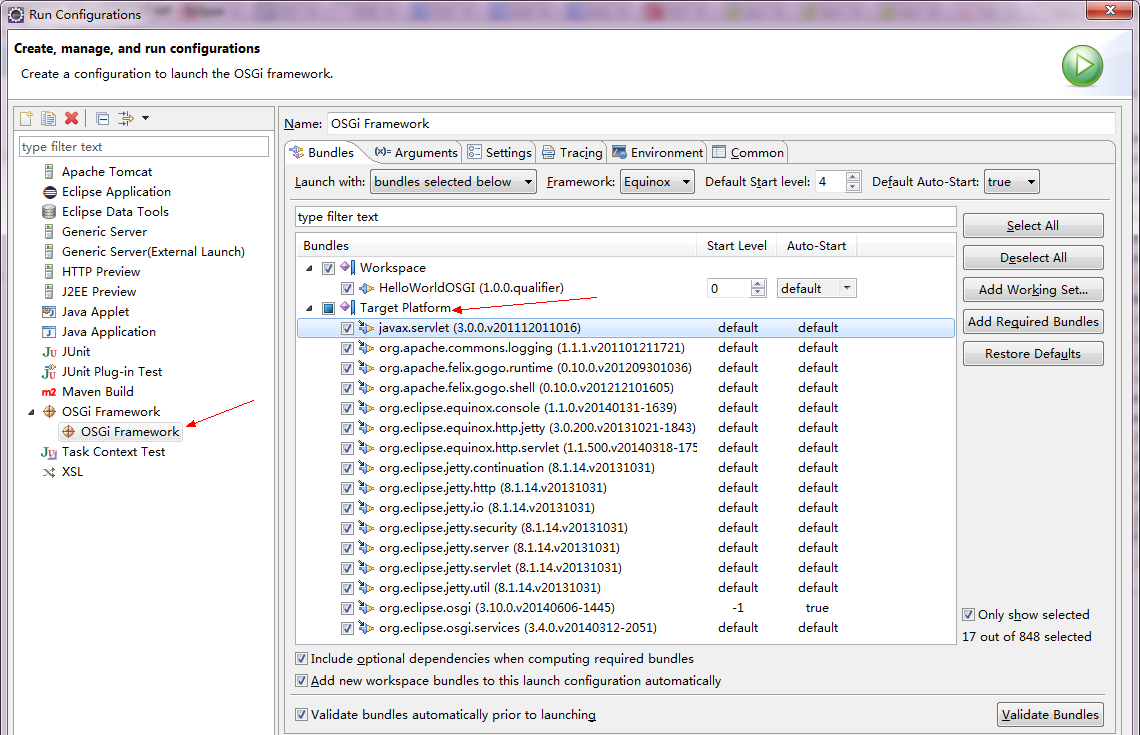
保留图中TargetPlatform中的16个Bundle。
c.在Run Configuration中设置参数
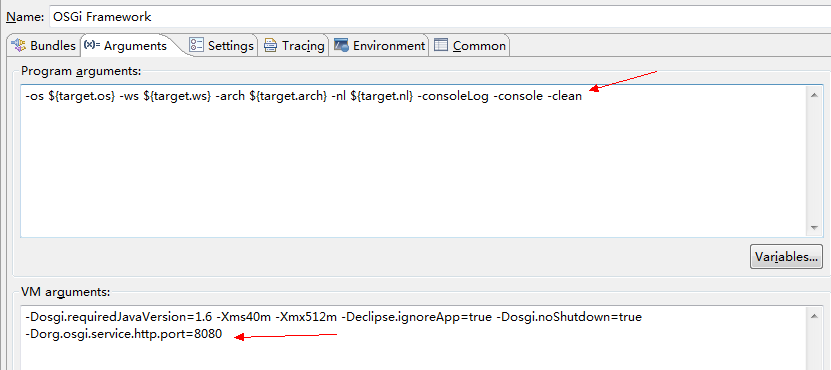
友情提示:如果有其他异常请查看提示信息,利用 http://www.aolsearch.com/ 查询提示信息(英文),如果发现http://stackoverflow.com/这个网站有相同提问,基本就知道答案近在咫尺了。
比如笔者遇到的问题:Root exception:java.lang.IllegalStateException: Workbench has not been created yet.
解决方法就是在http://stackoverflow.com/questions/13773582/workbench-has-not-been-created-yet-error-in-eclipse-plugin-programming中找到的。
d.在MANIFEST.MF(META-INF)文件中将lib文件夹中的包都引入如下图中。

3.添加代码
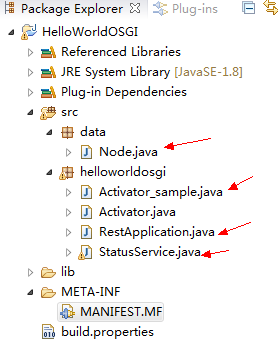
Activator_sample.java
package helloworldosgi; import java.util.Dictionary; import java.util.HashMap; import java.util.Hashtable; import java.util.logging.Logger; import javax.servlet.ServletException; import org.glassfish.jersey.servlet.ServletContainer; import org.osgi.framework.BundleActivator; import org.osgi.framework.BundleContext; import org.osgi.framework.ServiceReference; import org.osgi.service.event.Event; import org.osgi.service.event.EventAdmin; import org.osgi.service.http.HttpService; import org.osgi.service.http.NamespaceException; import org.osgi.util.tracker.ServiceTracker; /* * BundleActivator:让你能够捕捉到bundle的start和stop事件,并对这两个事件作出自定义的反应。 */ public class Activator_sample implements BundleActivator { private BundleContext bc; @SuppressWarnings("rawtypes") private ServiceTracker tracker; private HttpService httpService = null; private static final Logger logger = Logger.getLogger(Activator.class.getName()); /** * URL前缀 */ public static final String CONTEXT_PATH = "/rest/json"; /* * BundleContext:一个bundle在框架中的执行时上下文,这个上下文提供了和框架进行交互的方法。 * @see org.osgi.framework.BundleActivator#start(org.osgi.framework.BundleContext) */ @SuppressWarnings({ "unchecked", "rawtypes" }) @Override public synchronized void start(BundleContext bundleContext) throws Exception { this.bc = bundleContext; logger.info("STARTING HTTP SERVICE BUNDLE"); this.tracker = new ServiceTracker(this.bc, HttpService.class.getName(), null) { @Override public Object addingService(ServiceReference serviceRef) { httpService = (HttpService) super.addingService(serviceRef); registerServlets(); return httpService; } @Override public void removedService(ServiceReference ref, Object service) { if (httpService == service) { unregisterServlets(); httpService = null; } super.removedService(ref, service); } }; this.tracker.open(); logger.info("HTTP SERVICE BUNDLE STARTED"); } /* * BundleContext:一个bundle在框架中的执行时上下文,这个上下文提供了和框架进行交互的方法。 * @see org.osgi.framework.BundleActivator#stop(org.osgi.framework.BundleContext) */ @Override public synchronized void stop(BundleContext bundleContext) throws Exception { this.tracker.close(); } private void registerServlets() { try { rawRegisterServlets(); } catch (InterruptedException | NamespaceException | ServletException ie) { throw new RuntimeException(ie); } } private void rawRegisterServlets() throws ServletException, NamespaceException, InterruptedException { logger.info("JERSEY BUNDLE: REGISTERING SERVLETS"); logger.info("JERSEY BUNDLE: HTTP SERVICE = " + httpService.toString()); // TODO - temporary workaround // This is a workaround related to issue JERSEY-2093; grizzly (1.9.5) // needs to have the correct context // classloader set ClassLoader myClassLoader = getClass().getClassLoader(); ClassLoader originalContextClassLoader = Thread.currentThread() .getContextClassLoader(); try { Thread.currentThread().setContextClassLoader(myClassLoader); httpService.registerServlet(CONTEXT_PATH, new ServletContainer(), getJerseyServletParams(), null); httpService.registerResources(CONTEXT_PATH + "/hello", "/webroot", null);//前面必须带“/”,后面不一定 } finally { Thread.currentThread().setContextClassLoader( originalContextClassLoader); } // END of workaround - after grizzly updated to the recent version, only // the inner call from try block will remain: // httpService.registerServlet("/jersey-http-service", new // ServletContainer(), getJerseyServletParams(), null); sendAdminEvent(); logger.info("JERSEY BUNDLE: SERVLETS REGISTERED"); } @SuppressWarnings("serial") private void sendAdminEvent() { @SuppressWarnings("rawtypes") ServiceReference eaRef = bc.getServiceReference(EventAdmin.class .getName()); if (eaRef != null) { @SuppressWarnings("unchecked") EventAdmin ea = (EventAdmin) bc.getService(eaRef); ea.sendEvent(new Event("jersey/test/DEPLOYED", new HashMap<String, String>() { { put("context-path", "/"); } })); bc.ungetService(eaRef); } } private void unregisterServlets() { if (this.httpService != null) { logger.info("JERSEY BUNDLE: UNREGISTERING SERVLETS"); httpService.unregister(CONTEXT_PATH); logger.info("JERSEY BUNDLE: SERVLETS UNREGISTERED"); } } private Dictionary<String, String> getJerseyServletParams() { Dictionary<String, String> jerseyServletParams = new Hashtable<>(); jerseyServletParams.put("javax.ws.rs.Application", RestApplication.class.getName()); logger.info("kira2will" + RestApplication.class.getName()); return jerseyServletParams; } }
StatusService.java
package helloworldosgi; import java.util.ArrayList; import java.util.List; import java.util.logging.Logger; import javax.ws.rs.GET; import javax.ws.rs.Path; import javax.ws.rs.PathParam; import javax.ws.rs.Produces; import javax.ws.rs.core.MediaType; import data.Node; @Path("/status") public class StatusService { private static final Logger logger = Logger.getLogger(StatusService.class.getName()); @GET @Produces(MediaType.APPLICATION_JSON) public Node getStatus(){ List<Node> nodes = new ArrayList<Node>(); Node node = new Node("001", "60800","192.168.1.1","0","92","92","chizhou","50ms","hw"); Node nothingNode = new Node("null","null","null","null","null","null","null","null","null"); //nodes.add(node); nodes.add(node); logger.info(node.getName()); return node; } @Path("/{id}") @GET @Produces(MediaType.APPLICATION_JSON) public Node getID(@PathParam("id") int id){ List<Node> nodes = new ArrayList<Node>(); nodes.add(new Node("null","null","null","null","null","null","null","null","null")); nodes.add(new Node("001", "60600","192.168.1.1","0","92","92","tonglin","50ms","hw")); nodes.add(new Node("002", "60600","192.168.1.1","0","92","92","tonglin","50ms","hw")); nodes.add(new Node("003", "60600","192.168.1.1","0","92","92","tonglin","50ms","hw")); nodes.add(new Node("004", "60600","192.168.1.1","0","92","92","tonglin","50ms","hw")); nodes.add(new Node("005", "60600","192.168.1.1","0","92","92","tonglin","50ms","hw")); int defaultIndex = 0; if ( (id < 1) || (id > nodes.size() - 1) ){ logger.info(nodes.get(defaultIndex).getId()); return nodes.get(defaultIndex); } else{ logger.info(nodes.get(id).getId()); return nodes.get(id); } } }
RestApplication.java
package helloworldosgi; import java.util.HashSet; import java.util.Set; import javax.ws.rs.core.Application; import com.fasterxml.jackson.jaxrs.json.JacksonJsonProvider; public class RestApplication extends Application { @Override public Set<Class<?>> getClasses() { Set<Class<?>> result = new HashSet<Class<?>>(); result.add(JacksonJsonProvider.class); result.add(StatusService.class); return result; } }
Node.java
package data; import javax.xml.bind.annotation.XmlRootElement; @XmlRootElement public class Node { private String id; private String name; private String admin_ip; private String admin_status; private String longitude; private String latitude; private String location; private String latency; private String vendor_name; public Node(String id, String name, String admin_ip, String admin_status, String longitude, String latitude, String location, String latency, String vendor_name ){ this.id = id; this.name = name; this.admin_ip = admin_ip; this.admin_status = admin_status; this.longitude = longitude; this.latitude = latitude; this.location = location; this.latency = latency; this.vendor_name = vendor_name; } public String getId() { return id; } public void setId(String id) { this.id = id; } public String getName() { return name; } public void setName(String name) { this.name = name; } public String getAdmin_ip() { return admin_ip; } public void setAdmin_ip(String admin_ip) { this.admin_ip = admin_ip; } public String getAdmin_status() { return admin_status; } public void setAdmin_status(String admin_status) { this.admin_status = admin_status; } public String getLongitude() { return longitude; } public void setLongitude(String longitude) { this.longitude = longitude; } public String getLatitude() { return latitude; } public void setLatitude(String latitude) { this.latitude = latitude; } public String getLocation() { return location; } public void setLocation(String location) { this.location = location; } public String getLatency() { return latency; } public void setLatency(String latency) { this.latency = latency; } public String getVendor_name() { return vendor_name; } public void setVendor_name(String vendor_name) { this.vendor_name = vendor_name; } }
4.浏览器中输入 http://localhost:8080/rest/json/status 即可访问public Node getStatus() 返回值。
或者输入 http://localhost:8080/rest/json/status/2 即可访问public Node getID(@PathParam("id") int id)返回值。
关于@Path @Get @PathParam 参考 http://www.docin.com/p-317614298.html 第七页。
http://download.csdn.net/detail/kira_will/9729055
原文地址:https://www.cnblogs.com/kira2will/p/5040264.html



